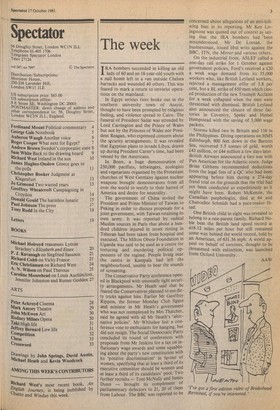The week
IRA bombers succeeded in killing an old lady of 60 and an 18-year-old youth with a nail bomb left in a van outside Chelsea barracks and wounded 40 others. This was feared to mark a return to terrorist operations on the mainland.
In Egypt serious riots broke out in the southern university town of Assyut, thought to have been prompted by religious feeling, and violence spread to Cairo. The funeral of President Sadat was attended by Lord Carrington and the Prince of Wales but not by the Princess of Wales nor President Reagan, who expressed concern about the spcurity arrangements. It was revealed that Egyptian plans to invade Libya, drawn up during President Carter's time, had been vetoed by the Americans.
In Bonn, a huge demonstration of 250,000 pacifists, leftwingers, ecologists and vegetarians organised by the Protestant churches of West Germany against nuclear weapons brought demonstrators from all over the world to testify to their hatred of America and desire for neutrality.
The government of China invited the President and Prime Minister of Taiwan to Peking in order to discuss proposals for a joint government, with Taiwan retaining its own army. It was reported by radical Muslim sources in Paris that about a hundred children injured in street rioting in Teheran had been taken from hospital and executed. The Milton Obote Foundation in Uganda was said to be used as a centre for torturing and murdering political opponents of the regime. People living near the centre in Kampala had left the neighbourhood, unable to bear the sounds of screaming.
The Conservative Party conference opened in Blackpool with unusually tight security arrangements. Mr Heath said that he feared the Conservatives planned to use dirty tricks against him. Earlier Mr Geoffrey Rippon, the former Monday Club figure and minister in Mr Heath's government who was not reemployed by Mrs Thatcher, said he agreed with all Mr Heath's 'alternative policies'. Mr Whitelaw lost a conference vote to enthusiasts for hanging, but did not resign. The Social Democratic Party concluded its round of conferences with proposals from Mr Jenkins for a tax on inflationary wage awards and some squabbling about the party's new constitution with its 'positive discrimination' in favour of women, specifying that at least a third of its executive committee should be women and at least a third of its candidates' pool. Two further recruits — Tom McNally and James Dunn — brought its complement of parliamentary defectors to 21, 20 of them from Labour. The BBC was reported to be
concerned about allegations of an anti-leftwing bias in its reporting. Mr Ken Livingstone was quoted out of context as saying that the IRA bombers had been misunderstood. Mr De Lorean, the businessman, issued libel writs against the BBC, ITN, the Mirror and various others.
On the industrial front, ASLEF called a one-day rail strike for 1 October against government policies, Ford's received a £20 a week wage demand from its 55,000 workers who, like British Leyland workers, rejected a management offer of 3.8 per cent, but a BL strike of 650 men which closed production of the new Triumph Acclaim for a week collapsed when the men were threatened with dismissal. British Leyland also announced the closure of three factories in Coventry, Speke and Hemel Hempstead with the saving of 3,000 wage packets.
Storms killed two in Britain and 116 in
the Philippines. Diving operations on HMS Edinburgh, 800 feet down in the Barents Sea, recovered 5.5 tonnes of gold, worth £43 million, or £44 million a few days later. British Airways announced a fare war with Pan American for the Atlantic route. Judge Brian Gibbens recommended deductions from the legal fees of a QC who had been appearing before him during a 274-day fraud trial on the grounds that the trial had not been conducted as expeditiously as it might have been. Robert McKenzie, the Canadian psephologist, died at 64 and Chancellor Schmidt had a pace-maker fitted.
One British child in eight was revealed to belong to a one-parent family. Richard Noble beat the British land speed record at 418.12 miles per hour but still remained some way behind the world record, held by an American, of 631.36 mph. A world appeal on behalf of tortoises, thought to be threatened with extinction, was launched from Oxford University.
AAW






































 Previous page
Previous page